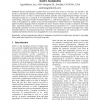853 search results - page 68 / 171 » Dyslexia and learning computer programming |
116
click to vote
ISPASS
2009
IEEE
15 years 7 months ago
2009
IEEE
Until recently, parallel programming has largely focused on the exploitation of data-parallelism in dense matrix programs. However, many important application domains, including m...
91
Voted
GECCO
2007
Springer
15 years 6 months ago
2007
Springer
Genetic Programming (GP) is an automated computational programming methodology, inspired by the workings of natural evolution techniques. It has been applied to solve complex prob...
90
Voted
CCIA
2005
Springer
15 years 6 months ago
2005
Springer
One of the main keys in case-based reasoning system is the retrieval phase, where the most similar cases are retrieved by means of a similarity function. According to the problem, ...
106
Voted
AI
2002
Springer
15 years 14 days ago
2002
Springer
This article surveys three techniques for enhancing heuristic game-tree search pioneered in the author's Othello program Logistello, which dominated the computer Othello scen...
121
Voted
INTERACT
2003
15 years 2 months ago
2003
: Whereas sophisticated computer users can exercise more control in what they are exposed to and produce computational artifacts, technologically challenged end-users assume a more...

